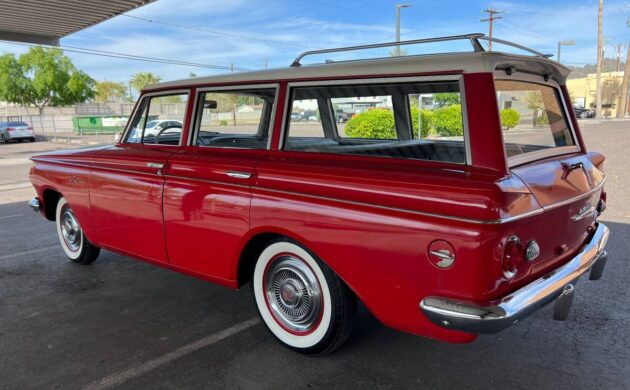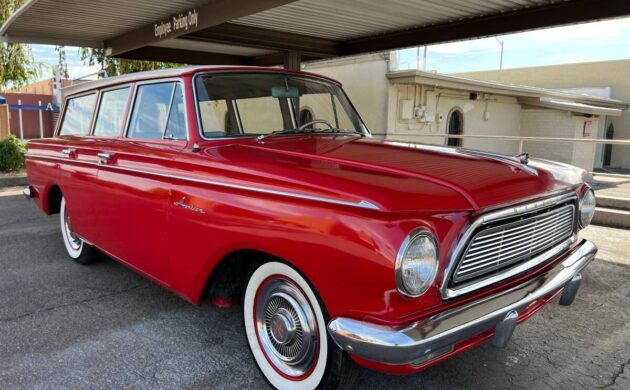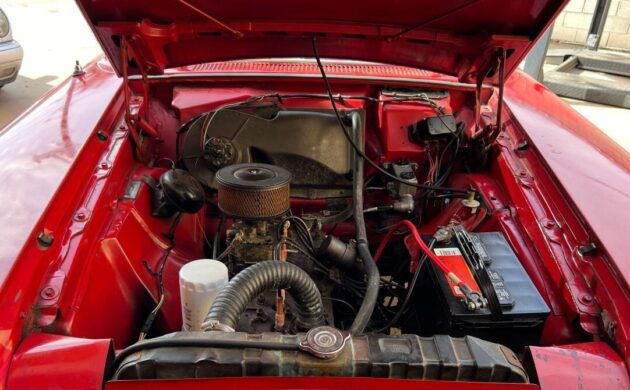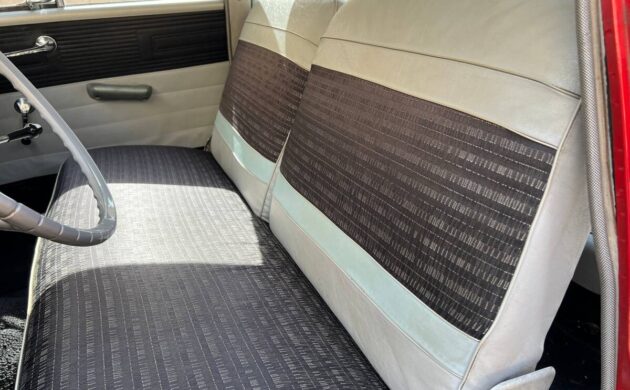The Rambler American was the forerunner in the compact car market which swept through U.S. automakers in the late 1950s and early 1960s. Studebaker would follow with the Lark in 1959, Ford with the Falcon in 1960, and the rest of the gang thereafter. This 1962 American 4-door Cross Country station wagon looks almost like a new car, wearing its original red paint and having only 49,000 miles on the clock. It could very well be the nicest American left from this era. From Scottsdale, Arizona, a dealer seems to be involved in the sale of this beauty here on craigslist for $24,995. Our thanks to T.J. for the incredible tip!
American Motors was no newcomer to building smaller automobiles. The American was a derivative of a similar automobile that Nash brought to market in 1950, four years before Nash and Hudson merged to form AMC. Three generations of the little car were produced: 1958 through to 1960, 1961 to 1963, and 1964 until the car was discontinued in 1969. The American was the last AMC product to carry the Rambler brand. Its successor debuted in 1970, the Hornet (a name reincarnated from the Hudson days).
The American’s claim to fame was its fuel economy, often winning the annual Mobilgas Economy Run. Not a bad showing for a car that was all about function and little about style. The shape of the 1961-63 editions was often referred to as “breadbox” due to their squarish shape. Changes to the 1962 models were minimal and continued to rely on a 196 cubic-inch inline-6 and a “3-on-the-tree” manual transmission was standard, as is the case with the seller’s pristine station wagon.
How this car has been able to retain its like-new looks isn’t known, but low mileage and indoor storage would be likely. The white over red paint (one small chip on the gas cap) is original as is the contrasting interior. The seller says there are no signs of rust, and the automobile is as solid as a rock. Perhaps it was deposited in a time capsule years ago and only just now released! In any event, the performance of the car is said to be better than ever, and the appearance of the car supports that. The seller provides a video to help convince buyers that an early 1960s Rambler is worth $25k.










So smart to have that oil filter right up top and easily accessible.
Wait a few minutes, and it would drain back into the crankcase and would be empty and easily replaced without a big hot mess all over your hands as you’re underneath the car. Is Rambler the only make that did this?
I’ve seen Studebaker 6 cylinders too with these. I believe they were still an option and weren’t an oil filter like today. While it was better than nothing, full pressure filters off the block, like on V8s, replaced these “seep and drain” jobs that were always a mess. I’ve long thought on modern cars, oil filter placement is an afterthought. My Saturn, what I considered the modern day Rambler, I had to take the right front wheel off to access the filter.
I was a Saturn tech for 13 years at a dealer and I never pulled a tire off to change an oil filter on any model Saturn. You must of had an S car and didn’t want to crawl under it in your driveway because you don’t have a lift so you pulled the rf tire and the 2 plastic splash shields off with the push pins as the filter is right by the alternator on the back of the block on the passenger side. Drove 2 beater s cars for 15 years one sc1 for 10 years and a a sw2 for 5 years.I know those little lost foam casted 1.9’s inside and out. Went to Spring Hill TN for 13 weeks of training over 10 years until GM came back into the picture and only did satellite training after that my last 3 years. Fun fact …Saturn division of GM closed Halloween 2009. Good little engines that had some issues but I don’t want to ”Rambler on”.
Further down Maggy mentions “foam cast”.
What does foam cast mean please?
LCL. It is a process that uses polystyrene molds in the casting process and when the molten aluminum is poured into the sand pour hole sand mold with a polystyrene model of what is to be casted such as the engine block and cylinder head the polystyrene evaporates and aluminum takes it’s place.It’s poured untill it comes out of the riser hole. Look at a Saturn s car engine block and head it looks like aluminum styrofoam. The sand is then recycled.
Maybe not so smart to have the oil filter upside down due to the potential delayed oil pressure upon start-up. Wouldn’t this increase what’s called, “dry start” time? Some oil filters have back-flow valves and some do not; but even those with back-flow valves might not hold all night upside down? Right side up guarantees a full oil filter upon start-up.
It’s a partial-flow filter that has no impact on startup lubrication. Oil filters were originally optional on these engines. I’m not sure what year they became standard equipment.
I had a Benz and a Toyota with up-top oil filters. Such a smart and well thought out thing. So easy to replace when changing oil…. And way cleaner too.
VW Golf and Jetta, also
If i had the space, i would snag this one in a minute. My father had one, Gold with a white roof. What great memories. Looks in pretty good shape 👌
Beautiful car.I think it’s worth it.I love wagons as they are utiltarian. Hard to believe that paint is original it looks awesome.My buddies uncle had a 63 or 64 rambler 660 cross country wagon (the newer body style) and would coat the entire underside of the car with Texaco Marfak grease with an old paint brush and remove the door panels and dump used motor oil inside the door bottoms.He always street parked it never was in the driveway.Car never got rusty.
Being a wagon, I was kind of expecting to see an OHV unit under the hood. Still a beautiful car. Well, these weren’t exactly pretty.
This is one beautiful little wagon. As a minor correction and no offense good sir, this is an American wagon not a cross country smaller platform. Thank you for your hard work Russ and barn finds carry on!!
Grandma had a black one just like this. Remember riding in the back no car seat or seatbelt. That car is as conservative as you can get but I liked it.
My ‘56 Studebaker Scotsman Business coupe, flathead 6, manual transmission with overdrive, was advertised a 29 mpg. But it wasn’t a compact. Great car. Paint: Glasgow gray.
My exact first car. Minus the cracked windshield mine had and the pink (flesh?) factory paint. My aunt said she loved that car when she gave it to me. But it was my first set of wheels. Push button auto trans and I think it had a 258cid 6cyl. This engine and trans combo were tough. I did everything I could to blow it up but it was like a Timex watch, just kept ticking . . .
A year later when I finally saved enough to buy my own car, I gave it to my cousin who sold it 2 years later for $300!
Unless your Rambler had a transplant, the 258 wasn’t available until 1971. All you could get was a 195 six in both flathead and OHV form.
Had a ’62 Classic Custom 2-door with
the same engine and loved it. Even
though it was an automatic, it still got
near 33 MPG on the highway. Simple and honest cars all the way. Sure wish I had one now, at least I wouldn’t
be paying $500 to have the oil changed in my Kia K-5. Labor rates
here in Florida are wasay out of hand.
If I had space and money, this would be mine right now.
Another car in my back yard. It looks really good the price is the thing that would slow me down. I could live with the oil filter!
I have a 63 breadbox Rambler American 2 door hardtop. 44,000 miles original. it was Zebarted when new and rust free now.
The car looks immaculate in its condition, not my type of car but it’s truly amazing!
What does “Ford with the Falcon in 1960 and the rest of the gang thereafter” mean?
The Falcon, Chrysler’s Valiant and the Chevrolet Corvair all debuted within days of one another in ’59 as 1960 models.